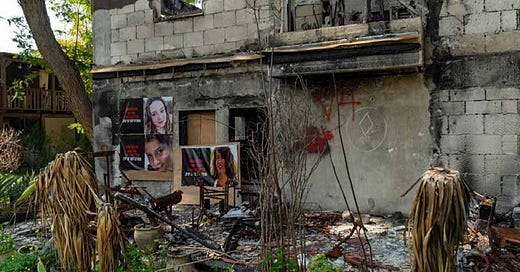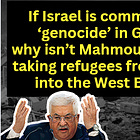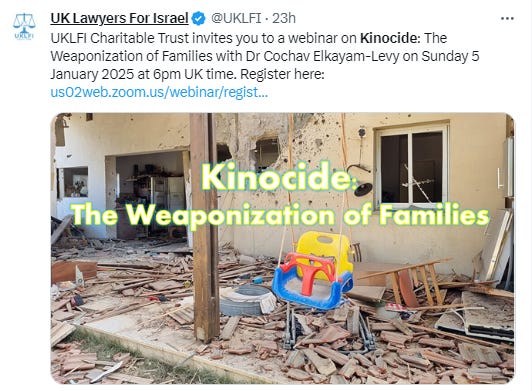"Kinocide" A New Crime Against Humanity: Exposing the Weaponization of Families
The Civil Commission on October 7th Crimes Against Women and Children is Exposing the Weaponization of Families: Giving It a Name and Legal Context
On October 7, 2023, during the Jewish holiday of Simchat Torah, thousands of Hamas and terrorists from other organizations, together with thousands of “innocent” civilians from Gaza, launched a coordinated attack on Israel’s civilian population. The scale and brutality of the assault should have shocked the world: over 1,200 people were murdered, and more than 250 people, including babies, the elder and everything in between, were abducted and taken into Gaza.
The horrors perpetrated on that day constitute a textbook case of genocide, and the world can no longer claim ignorance as it did in the aftermath of the Holocaust. This time, the international community witnessed the atrocities in real time. The crimes committed on October 7th include acts not yet fully encapsulated within the current legal definitions of genocide, underscoring the urgent need for a broader framework of accountability.
A new 76 page report by the Civil Commission on October 7th Crimes Against Women and Children, titled “A Crime Without a Name for Victims Without a Voice Kinocide: Uncovering the Weaponization of Families on October 7, 2023”, sheds light on the deliberate and systematic targeting of families during these horrific day. Prepared by Dr. Cochav Elkayam-Levy, Dr. Michal Gilad, and Dr. Ilya Rudyak, this report is a groundbreaking contribution to understanding and addressing the mostly ignored crime.
The Civil Commission on October 7th Crimes Against Women and Children was founded to document and raise international awareness of the war crimes and gender-based violence committed by Hamas and their collaborators against women, children and families during their brutal attack on Israel on October 7th.
The Civil Commission’s report was led by Adv. Merav Israeli-Amarant and supported by a dedicated team: COO Nirit Samocha, who oversees the infrastructure and technological systems; Adv. Elinor Kroitoru, former deputy director of the Yad Vashem archive, who heads the archive and documentation division; Adv. Irit Gazit, responsible for the collection of materials and testimonies; and Danae Marx, who manages international communications and outreach. Their combined efforts made this report possible.
Systematic and Targeted Assault on Families


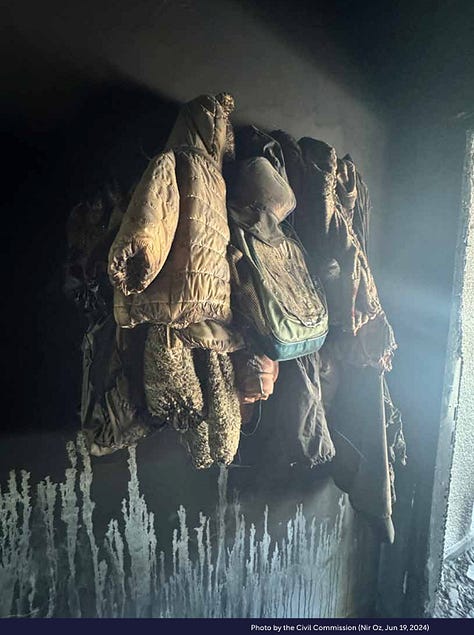
The report focuses on the atrocities committed in kibbutzim and residential communities, where entire families were brutally attacked. The evidence reveals chilling patterns: parents were murdered in front of their children, entire families were annihilated, and survivors were forced to witness the horrors inflicted on their loved ones. Families, traditionally safe havens, became sites of terror and destruction, underscoring the intentional targeting of familial bonds as a weapon of psychological and societal devastation.
“The atrocities committed by Hamas militants and their affiliates on October 7 in the "Gaza Envelop” inside Israel shocked us to the core, not only because they represented the largest massacre of Jews since the Holocaust, but also because of the unspeakable cruelty that constituted and accompanied these atrocities. The Commission's report took upon itself the difficult, but critically important, task of uttering part of the unspeakable, and developing a suitable term for capturing some its evil essence - kinocide. Like genocide, which is directed against a group of people, Kinocide represents an attack against a group, using the family relationship holding between family members and their emotional, identity, cultural, symbolic, material and other bonds, as a way to maximize the intended harm of the attack. By describing this cruel practice and giving this a name, the Commission has taken an important step in the direction of recognizing this terrible crime against humanity and formulating suitable legal and social responses to it.” - Prof. Yuval Shany, International Law Professor at Hebrew University, Researcher at Israel Democracy Institute, former UN Human Rights Committee member
Weaponization of Digital and Social Media
Adding to the cruelty, Hamas exploited social media to amplify the trauma. Perpetrators used victims’ own accounts to broadcast acts of violence, ensuring that the pain reverberated far beyond the immediate victims. This digital violence inflicted profound psychological harm on survivors and the broader community, creating a ripple effect of fear and anguish.
"In an Age of Mass Atrocity, the systematic brutalization of families by Hamas on October 7th - horrors too terrible to be believed but not too terrible to have happened - constitute the Crime Against Humanity of Kinocide. There have been, tragically enough, too many mass atrocities in our time, but this one harbours an unprecedented evil: the glorification and celebration of these genocidal atrocities in real time on digital media, amidst the call to commit these mass atrocities “again and again and again.” This must serve as a wake-up call for the community of democracies to combat such mass atrocities— whatever their source— as we renew our individual and collective commitment to the pursuit of peace and understanding between states and peoples." - The Honorable Irwin Cotler, Founder and International Chair of the Raoul Wallenberg Centre for Human Rights and former Minister of Justice and Attorney General of Canada
Introducing the Term “Kinocide”
While much of the international community focuses its energy on redefining the term "genocide" in attempts to criminalize Israel, this report introduces a term that addresses an urgent and specific form of crime against humanity: “Kinocide.” This concept encapsulates the deliberate targeting and exploitation of families as a distinct form of violence, marking a critical step toward recognizing and addressing such atrocities in international law. By naming this phenomenon, the report provides victims with a framework to articulate their suffering and ensures that these crimes are neither overlooked nor repeated.
“What the Civil Commission on Oct 7 Crimes has done is what Jews have done throughout the centuries in the aftermath of tragedy – bring insight to anguish to light a path through it. But most importantly, the Commission has taken a major step toward eradicating evil by giving it a name. Now the Cambodians whose families were ripped apart, the Bosnians who witnesses their loved ones assaulted before their eyes, and the Iranians who were forced to turn on their kin, all know what to call that nameless experience that once shattered their lives, and how to trace its lineage to other victims in the human tree of suffering.” - Roya Hakakian, Writer and Cofounder of Iran Human Rights Documentation Center
A Global Phenomenon
The report addresses kinocide also within a broader historical and global context. From the Armenian Genocide and the cultural genocide of Indigenous peoples in Canada to atrocities in Rwanda, Syria, and Myanmar, similar patterns of violence against families have been documented. These acts, often lacking formal recognition or terminology, highlight the pervasive use of family destruction as a tool of control, ethnic cleansing, and societal extermination.
“On October 7, Hamas struck at the heart of the Jewish community: the family unit. Hamas’ atrocities against families were designed to break one of life’s strongest bonds. They tried, but they must never be allowed to succeed. This groundbreaking work by the Civil Commission, led by the incredible Dr. Cochav Elkayam-Levy, and supported by the Raoul Wallenberg Center methodically documents Hamas’ terror on that day. It also serves as a clarion call to the international community to stand up and take action to protect families across the globe from future acts of violence by classifying Kinocide as a crime against humanity.” - Sheryl Sandberg, Founder, Lean In
Legal and Policy Implications

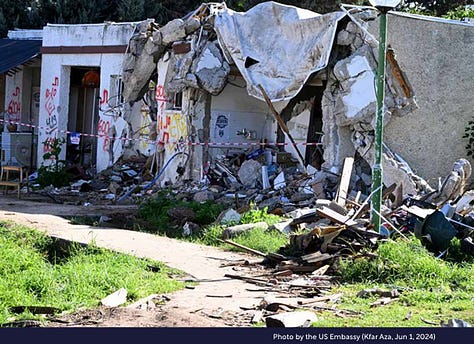

Current international criminal law does not adequately address the targeted destruction of families. The report calls for the integration of kinocide into legal frameworks as a crime against humanity, a war crime, a form of genocide, and a form of torture. It proposes actionable steps, including:
Codifying Kinocide: Amend instruments like the Rome Statute to include Kinocide and explore new treaties or conventions.
Establishing Expert Panels: Create an independent international panel to define Kinocide and guide its legal recognition.
National Legislation: Encourage governments to criminalize Kinocide domestically, including incitement and complicity.
NGO Engagement: Support NGOs in monitoring and documenting Kinocide to aid prevention and accountability.
Victim Support: Develop an international fund to support victims and their families.
“This report furthers the cause of justice in conflict by seeking to name and pursue accountability for systematic attacks on those whom we cherish most: our loved ones. As the report explains, this horrific pattern of behavior is, unfortunately, present across many conflicts and throughout history, including on October 7, 2023, in southern Israel. The report is an important step in efforts to pursue justice for victims of Kinocide worldwide and to acknowledge the entirety of the harm they suffered.” - Prof. Nienke Grossman, Professor of Law and Co-Director of the Center for International and Comparative Law at the University of Baltimore School of Law
Recognizing and Combating Kinocide



Recognizing Kinocide as a distinct international crime is a moral and legal obligation. By naming and addressing this phenomenon, we can provide justice to the victims, hold perpetrators accountable, and take a crucial step toward preventing such atrocities in the future.
"This study not only provides important and compelling documentation of the horrific atrocities of October 7th, but also a significant proposal for a new crime in international law. The legal and conceptual framework of Kinocide merits further study and consideration in the broader context of international criminal law." - Prof. William W. Burke-White, law professor and policy advisor; Inaugural Director of Perry World House, an interdisciplinary global policy research institute at the University of Pennsylvania
While the world’s gaze often fixates on politically driven narratives, trying to redefine the crime of “genocide”, all aimed at demonizing Israel, the deliberate targeting of families by Hamas is a glaring and urgent crisis, specially as 100 hostages, including babies, remain captive. The introduction of the term “kinocide” offers a vital tool to confront and address these atrocities, not as a distraction, but as a necessary correction to the selective indignation from the international community and “human rights” organizations.
UKLFI Charitable Trust will be hosting a webinar on Kinocide: The Weaponization of Families with Dr Cochav Elkayam-Levy on Sunday 5 January 2025 at 6pm UK time. Register here

